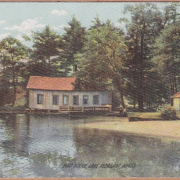Cabin Scheduling: Sharing Is Not Always Easy
Everyone loves the family cabin. Sometimes that love for the family cabin can make it hard to share when there are more than a couple owners involved. Understanding this dynamic, scheduling time at the beloved cabin can be a great challenge.
The owners of a cabin often find it works best to have a formal plan for use of the cabin. A formal plan is normally found in a scheduling system that is part of a limited liability company’s operating agreement.
The scheduling plans used for family cabins are as unique as the families involved. Many families like to rotate weeks. Some families set up a system where a family gets top pick one year, then moves to the bottom of the list. One such system reserves the cabin for five weeks each year for family gatherings and maintenance. The remaining weeks are assigned on a rotational basis and run from Friday afternoon to Friday afternoon. The order of the rotation changes each year.
It is not a bad idea to plan for the holidays and offer a wild card week. Some families like to meet annually at the cabin or local pub to develop rules for use as well, such as no smoking and other restrictions to keep the cabin nice. A plan for dogs and cats is also advisable. Finally, whether to allow non-family individuals to use or rent the cabin should be discussed and addressed via a written agreement. Cleaning up after one’s self is also popular in these agreements.
Here is some sample scheduling language found in one family’s operating agreement:
Occupancy. The Cabin shall be used for the personal, non-commercial, enjoyment of the Members, their respective families, and guests. The Members will make and adjust rules and regulations regarding the use and enjoyment of the Cabin. Such rules will cast equal burden and benefit on the Members without regard to their membership interest. Under no circumstances will any Member use the Cabin so as to deprive the other Members of their respective and similar use.
Personal Use Allocation and Non-proportional Expenses. At the Annual Meeting each year, the Members shall determine an allocation of personal use by weeks for the upcoming calendar year. Each Member shall pick on a rotating basis which weeks he or she wishes to reserve for personal use. Each week shall be deemed to run from Sunday at noon to the following Sunday at noon. The year shall be divided initially into nine holiday weeks which include the following: Easter, Memorial Day, 4th of July, Labor Day, Columbus Day, Thanksgiving, Christmas, New Year’s Day, and wild card week. The balance of the year represents 43 weeks and shall be allocated after the initial eleven holiday weeks have been selected. The wild card week can be any week of the year other than those holiday weeks listed. The selection process shall operate in the following manner for the holiday weeks:
- Each Member is entitled to three choices among the 9 holiday weeks.
- The Members will rotate who gets the first choice each year, with each Member moving down one position and the Member in the third position moving to first position in the subsequent year.
- For the balance of the 43 weeks, the procedure is to repeat the selection process that was done for the holidays.
- At the annual meeting in December of each year, there will be adjustments made to the weekly stays, which normally run from Sunday at noon to the following Sunday at noon. These adjustments are to be made in light of the Thanksgiving holiday, in which it is anticipated that the week would flow from the Wednesday at noon preceding Thanksgiving Day to the following Wednesday, and that the following week would be a long week. Also, holiday weeks for Christmas, New Year’s Day and the Fourth of July may be adjusted, depending on the day of the week in which the holiday falls.
The attorney-in-fact for the Company shall maintain the schedule of usage for the Cabin.
Rental of Cabin. Notwithstanding the intent of the Members that the Cabin is primarily for their personal use, it is acknowledged and understood that the Company may permit, within the limitations of further specified rules and regulations to be promulgated, individuals other than the Members to use the Cabin.
Such third parties will sometimes be charged rent and sometimes will not be charged rent. Relative to such third-party use of the Cabin, it is agreed that rental of the Cabin to third parties for purposes of obtaining rental income shall be ancillary rather than a primary goal of the Company.
The rental rate to be charged to third parties shall be set by the affirmative vote of a majority of the Members and shall initially be set at annual or special meetings of members at $1500 per week (or if rented on a daily basis, $200 per night for Monday through Thursday nights and $250 per night for Friday, Saturday, and Sunday nights). These rates can be changed by the affirmative majority vote or advance written approval of the holders of a majority of the percentage interests in the company without necessitating a written amendment to this Agreement.
The Members agree that from time to time third parties, such as family or friends of the Members, or business associates or contacts of the Members may be granted permission by one or more of the Members to use the Cabin on a rent-free basis. Such rent-free use is intended to allow the Members to use the Cabin in a courtesy fashion, and the Member extending such courtesy to the third party shall be considered to have personally used the Cabin during the period of time when the third party is occupying the Cabin rent-free. Nevertheless, the Member permitting such use shall be responsible for arranging post-use cleaning service.
The Members also agree that Members will have to pay rent on “rentable weeks”. The “rentable weeks” in each calendar year will be set by the affirmative vote of a majority of the Members at the annual meetings of Members. The rental rate for Members shall initially be set at $1,000 per week. Any changes to the rental rate to be charged to Members and family and friends of Members shall be made by the affirmative vote of a majority of the Members at annual or special meetings of Members.
Third-party and Member rental income will be placed in the Company checking account to be used as all other monies in the account are used. Such third-party and Member rental income shall operate to reduce proportionately the funds and additional capital needed from the Members. An accounting of such revenues shall be provided periodically by the attorney-in-fact.
Restrictions. Smoking in the Cabin shall be absolutely prohibited. Any guests shall be told emphatically not to smoke in the Cabin. The purpose of this provision is to respect the health of the Members and guests of the Cabin. Domesticated animals are allowed in and around the Cabin so long as the animals are kept according to local laws and ordinances (including leash laws) and the party with the animals cleans up after them.
Any cleaning expenses required to alleviate the damage and odor caused by a violation shall be borne by the Member who is using the Family Cabin or permitting rent-free use of a third party at the time of the violation. Paying guests will charged for any cleaning expenses required to alleviate the damage and odor caused by a violation.
Expectation for Sharing of Chores. Understanding that some Members may use the Cabin more than others, the Members who intend to use the Cabin on a routine basis will be responsible for routine chores, including, but not limited to, mowing, snow removal, and opening and closing up the Cabin at the end of the season.
Departure/Cleaning. To maintain the value of the Cabin, each Member is responsible for leaving the Cabin clean, including kitchen, refrigerator, bathrooms, and all other areas. An overnight supply of toilet paper and paper towels should be left for the next guests.
The language above is a sample. Please keep in mind that every family is unique. This is just one family’s idea on how to schedule a cabin and to memorialize the schedule in writing. We are sharing it to help spark discussion between family members that co-own a vacation property. It is for your information and is not intended as legal advice.








Leave a Reply
Want to join the discussion?Feel free to contribute!